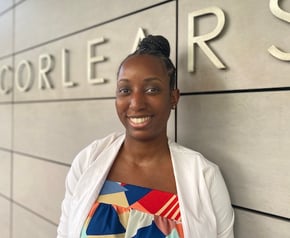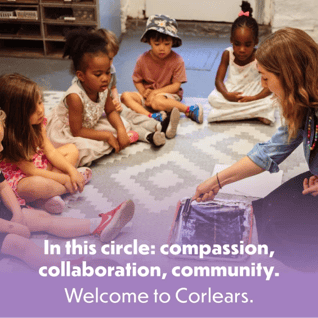At Corlears School, project-based learning is a critical part of our education philosophy, where our students engage in hands-on learning experiences that are designed to encourage critical thinking skills and asking questions, as well as creative problem solving. One of our favorite examples of project-based learning at Corlears is the Kindergarten Post Office! In this annual project, our Kindergarteners take learning about letter writing and the United States Postal Service to an immersive level as they create and run their own in-school post office where students across grade levels are encouraged to send mail to each other. Below, Kindergarten Head Teacher Olympia Hamlor shares more about this incredible project and the curricular value of project-based learning.
Why project-based learning?
Project-based learning (PBL) allows children to take ownership of their learning as they collaborate, create, and reflect, building essential skills such as critical thinking, communication, and problem-solving. Incorporating this real-world, interdisciplinary approach in the Kindergarten curriculum is vital for fostering a love of learning, promoting independence, and helping young learners connect abstract concepts to their daily lives.
At this stage, children are naturally curious and eager to understand how the world works, making it the perfect time to introduce them to deeper, more meaningful explorations. PBL allows us to tap into this curiosity by designing projects that are engaging, relevant, and aligned with real-life experiences, making the learning process both exciting and educational.
The Kindergarten Post Office in Action
The Kindergarten Post Office is a wonderful way to incorporate experiential learning into the classroom, because it helps students develop a deeper understanding of community systems while practicing collaboration and problem-solving – all through the real-world purpose of sending and receiving letters. The project features several key components, which help children explore how people communicate and connect, while also learning about community helpers, systems, writing, geography, and more, through the joyful lens of mail!
Learning to Write Letters – With Purpose
As a first step in their understanding of mail, our students study and practice how to write friendly letters. Students also learn how to clearly address the envelope to their recipient. This not only establishes their understanding of how systems work and how attention to detail helps things run smoothly, but also builds their fine motor skills and knowledge of writing conventions.
The Journey of a Letter
An important component of helping our students connect our school post office to the real-life USPS involves understanding what happens to letters after they are mailed. Kindergartens are encouraged to think critically and ask questions about the journey their letter takes, as they learn about the role of postal workers and mail carriers, how mail is transported, and tools that postal workers use to keep the mail organized — all of which highlights how teamwork is involved in getting a letter from one place to another. We also visit a USPS post office, so Kindergarteners can see this all happening in real life.
.jpg?width=743&height=543&name=Mailing%20Letters%20Updated%20(1).jpg)
Geography and Systems Thinking
In learning about where our mail travels, our students gain familiarity with ZIP codes and regions. This helps our Kindergarteners develop a basic understanding of geography and how interconnected the world is.
Strengthening Our Community Through Kindness and Connection
At the heart of our study is the joy of reaching out to others — expressing appreciation, asking questions, offering encouragement, or simply saying hello. These everyday acts of kindness and communication support our social-emotional learning goals and reinforce the value of thoughtful relationships.
Mail Your Letter at the Kindergarten Post Office!
Our project culminates in a “Corlears Post Office” that is open to all the students and faculty at Corlears, run by our Kindergarteners. The students take on rotating roles, including letter writers, sorters and clerks, and mail carriers. They also collaborate to create mailboxes for each classroom in the school, a mail truck for deliveries, and a sign to show when the post office is open or closed. To extend this project to include the whole Corlears community, all our classrooms are given “money” to purchase stamps, envelopes, packages, and more from the Kindergarten Post Office so they can mail each other letters and packages. This year, our Kindergarteners even sold and created Corlears Passports at the post office!
The Value of Project-Based Learning
The Kindergarten Post Office is just one of many PBL initiatives that form a core part of the Corlears curriculum. This dramatic play and role-based learning supports a wide range of goals, from oral language development and fine motor skills to collaboration, problem-solving, and taking initiative. Our classroom post office turns academic learning into a meaningful, immersive experience — one that brings reading, writing, and critical thinking to life.





